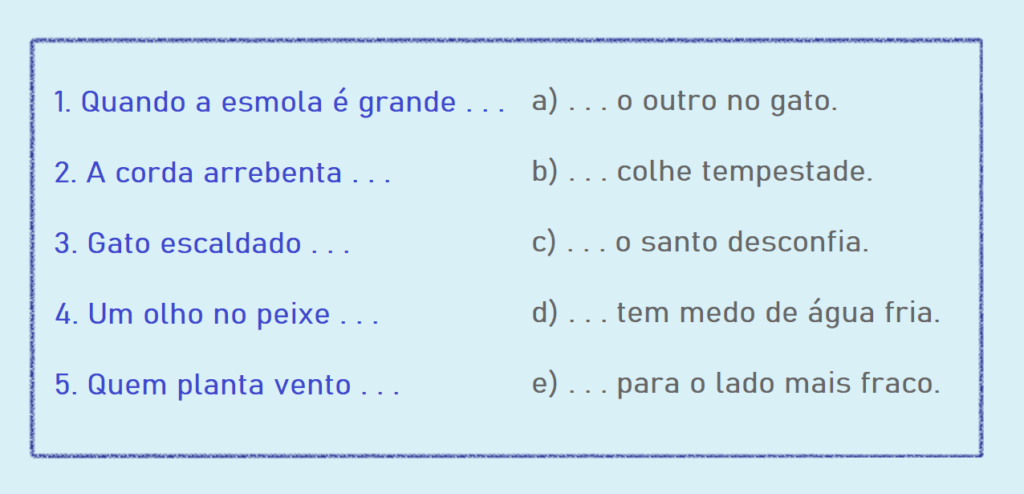Can you match these sayings in Portuguese? Posted by carol on Nov 24, 2021 in Brazilian Profile, Culture, Customs, History, Learning, Slang, Vocabulary
Olá, pessoal! Hi, everyone! Every language and culture has their own sayings, or as it goes in Portuguese, provérbios or ditados populares. They are common expressions dating back from ancient times whose origins no one can really pinpoint, but most falantes (speakers) of a certain language have heard. Usually in a metaphorical style, sayings describe situations or express general truths that are part of our vidas cotidianas (everyday lives). Just off the top of your head, how many sayings in your language can you remember? And what about in Portuguese?
So today we have got a little desafio (challenge) for you. I rounded up five popular sayings that all Portuguese speakers are familiar with, and your task is to have a look at them and try to match o começo (the beginning) with o final (the ending) of each one. And to make it even more interesting, you can also try to adivinhar (guess) what they mean!
Okay, ready? Do you have all your respostas (answers)? Now scroll down for the key:
Quando a esmola é grande, o santo desconfia
- Literal translation: When the donation is too generous, the saint gets suspicious.
- English equivalent: Sounds too good to be true.
- Meaning: When someone acts too kindly, there must be something wrong behind it so it’s better to be careful.
A corda sempre arrebenta pro lado mais fraco
- Literal translation: The rope always breaks on its weaker end.
- English equivalent: A chain is only as strong as its weakest link.
- Meaning: Those who are powerless and deprived of means will always be at a disadvantage when problems arise.
Gato escaldado tem medo de água fria
- Literal translation: A scalded cat is afraid of cold water.
- English equivalent: A burnt child dreads the fire; Once bitten, twice shy.
- Meaning: A person who has been through an unpleasant situation tends to be more careful so as to avoid running the same risk again.
Um olho no peixe e outro no gato
- Literal translation: An eye on the fish and the other on the cat.
- English equivalent: Keep your eyes wide open.
- Meaning: Be sharply aware of your surroundings so as to prevent any potential problems.
Quem planta vento colhe tempestade
- Literal translation: Those who sow wind reap a storm.
- English equivalent: You reap what you sow; What goes around, comes around.
- Meaning: Your negative actions in the present will have negative consequences in the future.
So, como foi a sua pontuação? How was your score? Did you get them all right? If you know any other ditados populares in Portuguese, make sure to comment below! Até semana que vem!

Build vocabulary, practice pronunciation, and more with Transparent Language Online. Available anytime, anywhere, on any device.





Comments:
Rana:
O fruto do meu vizinho parece melhor do que meu.
(The grass is always greener on the other side.)
No dia de São Nunca
(Once in a blue moon.)
O futuro pertence a Deus.
(We never know what the future will bring.)
Venda o almoço para comprar o jantar.
(Rob Peter to pay Paul)
carol:
@Rana Wonderful, Rana! Those are great sayings indeed.
Thanks for reading our blog 🙂